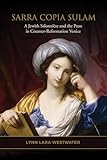Sarra Copia Sulam : A Jewish Salonnière and the Press in Counter-Reformation Venice / Lynn Lara Westwater.
Material type: TextSeries: Toronto Italian StudiesPublisher: Toronto : University of Toronto Press, [2019]Copyright date: 2020Description: 1 online resource (384 p.) : 22 b&w illustrationsContent type:
TextSeries: Toronto Italian StudiesPublisher: Toronto : University of Toronto Press, [2019]Copyright date: 2020Description: 1 online resource (384 p.) : 22 b&w illustrationsContent type: - 9781487505837
- 9781487532789
- Jewish women authors -- Italy -- Venice -- Biography
- Jewish women -- Italy -- Venice -- Biography
- Salons -- Italy -- Venice -- History -- 17th century
- HISTORY / Renaissance
- Christian-Jewish dialogue
- Counter-Reformation
- Italy
- Jewish history
- Jewish poetry
- Sara Copia Sulam
- Sarra Copia Sulam
- Venice
- history of publishing
- salons
- westwate
- women’s writing
- 851.5 23
- PQ4634.S83 Z935 2020
- online - DeGruyter
| Item type | Current library | Call number | URL | Status | Notes | Barcode | |
|---|---|---|---|---|---|---|---|
 eBook
eBook
|
Biblioteca "Angelicum" Pont. Univ. S.Tommaso d'Aquino Nuvola online | online - DeGruyter (Browse shelf(Opens below)) | Online access | Not for loan (Accesso limitato) | Accesso per gli utenti autorizzati / Access for authorized users | (dgr)9781487532789 |
Frontmatter -- Contents -- Figures -- Acknowledgments -- Abbreviations -- Timeline -- Dramatis Personae -- Note on the Text -- Introduction -- 1. The Birth of a Salon (1618–1621) -- 2. A Rupture in the Salon (1619–1621) -- 3. The Salon and the Venetian Presses (1621) -- 4. Copia Sulam Compromised (1622–1623) -- 5. Friends and Enemies (1621–1626) -- 6. The Salon’s Afterlife (Post-1626) -- Biographical Note: Sarra Copia Sulam in the Venetian Ghetto -- Appendix A: Last Will and Testament of Simon Copio -- Appendix B: Inventory of Simon Copio’s House at His Death -- Appendix C: Currency Values -- Notes -- Bibliography -- Index
restricted access online access with authorization star
http://purl.org/coar/access_right/c_16ec
For nearly a decade at the height of the Counter-Reformation in Italy, the Jewish poet and polemicist Sarra Copia Sulam (ca. 1592–1641) hosted a literary salon at her house in the Venetian ghetto, providing one of the most public and enduring forums for Jewish-Christian interaction in early modern Venice. Though Copia Sulam built a powerful intellectual network, published a popular work on the immortality of the soul, and gained fame for her erudition, her literary career foundered under the weight of slanderous charges against her sexual, professional, and religious integrity. This first biography of Copia Sulam examines the explosive relationship between gender, religion, and the press in seventeenth-century Venice through a study of the salonnière’s literary career. The backdrop to this inquiry is Venice’s tumultuous religious, cultural, and political climate and the competitive world of its presses, where men and women, Christians and Jews, alternately collaborated and clashed as they sought to gain a foothold in Europe’s most prestigious publishing capital.
Mode of access: Internet via World Wide Web.
In English.
Description based on online resource; title from PDF title page (publisher's Web site, viewed 19. Oct 2024)


